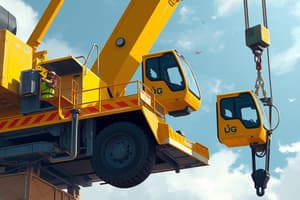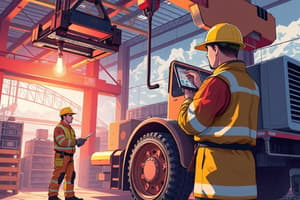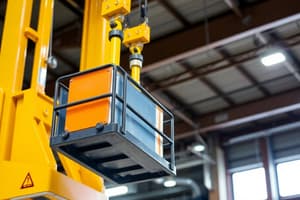Podcast
Questions and Answers
What is the document number for the QP Procedure for Lifting Equipment?
What is the document number for the QP Procedure for Lifting Equipment?
- QP-HSE-STD-021
- QP-PAI-PRC-004 (correct)
- QP-STD-Q-004
- QP-STD-R-008
Which corporate document references fire and safety?
Which corporate document references fire and safety?
- QP-IMS-MAN-01
- QP-GDL-S-069
- QP-STD-S-024
- QP-PHL-S-001 (correct)
Which document is associated with HSE incident reporting?
Which document is associated with HSE incident reporting?
- QP-OHH-STD-011
- QP-STD-Q-004
- QP-HSE-STD-021 (correct)
- QP-REG-S-001
What type of system is referred to by the document number QP-IMS-MAN-01?
What type of system is referred to by the document number QP-IMS-MAN-01?
Which document addresses training and certification for contractors?
Which document addresses training and certification for contractors?
What is required for lifting equipment to be used according to QP standards?
What is required for lifting equipment to be used according to QP standards?
What information must be included on LE Personnel Training identification cards?
What information must be included on LE Personnel Training identification cards?
How often does the colour coding for lifting equipment need to be renewed?
How often does the colour coding for lifting equipment need to be renewed?
What happens to items that are marked with a red colour under QP coding system?
What happens to items that are marked with a red colour under QP coding system?
What documents must be presented for endorsement of lifting equipment certificates?
What documents must be presented for endorsement of lifting equipment certificates?
Where can the colour code for equipment inspections be confirmed?
Where can the colour code for equipment inspections be confirmed?
What is the role of the QP Competent Person regarding lifting equipment?
What is the role of the QP Competent Person regarding lifting equipment?
What happens to equipment inspected outside the scheduled period?
What happens to equipment inspected outside the scheduled period?
What is the minimum size of crane pads required to help disperse weight under the crane's outriggers?
What is the minimum size of crane pads required to help disperse weight under the crane's outriggers?
Which of the following must be inspected during the six-monthly thorough inspection of mobile cranes?
Which of the following must be inspected during the six-monthly thorough inspection of mobile cranes?
What should be checked against wire rope certificates during crane inspections?
What should be checked against wire rope certificates during crane inspections?
How many 100% SWL tests must be performed annually in accordance with load chart requirements?
How many 100% SWL tests must be performed annually in accordance with load chart requirements?
What condition must the telescopic boom wear pads be in during inspections?
What condition must the telescopic boom wear pads be in during inspections?
What must be verified in the crane maintenance logbook?
What must be verified in the crane maintenance logbook?
Which safety device is NOT mentioned as part of the inspection process?
Which safety device is NOT mentioned as part of the inspection process?
Who can decide if NDT should be performed on crane components when necessary?
Who can decide if NDT should be performed on crane components when necessary?
How often should a crane be inspected by a QP Approved Inspection Service Provider?
How often should a crane be inspected by a QP Approved Inspection Service Provider?
What is the required action if wind speed exceeds 12 knots while raising or lowering personnel?
What is the required action if wind speed exceeds 12 knots while raising or lowering personnel?
What equipment must be present for communication between the crane operator and the vessel's captain?
What equipment must be present for communication between the crane operator and the vessel's captain?
Which of the following restrictions is applicable to the use of cranes in adverse weather conditions?
Which of the following restrictions is applicable to the use of cranes in adverse weather conditions?
What requirement is there for cranes that operate on the same rails?
What requirement is there for cranes that operate on the same rails?
What constitutes adequate stability for a vessel engaged in lifting operations?
What constitutes adequate stability for a vessel engaged in lifting operations?
Which feature is mandatory for all overhead traveling cranes?
Which feature is mandatory for all overhead traveling cranes?
What should be modified in existing cranes that lack limit switches?
What should be modified in existing cranes that lack limit switches?
What is required for cranes before commencing tests?
What is required for cranes before commencing tests?
How many tests must be performed for mobile cranes at different boom lengths?
How many tests must be performed for mobile cranes at different boom lengths?
What must be checked for correct operation during crane tests?
What must be checked for correct operation during crane tests?
What is a requirement for cranes with extendable fly jibs after reinstallation?
What is a requirement for cranes with extendable fly jibs after reinstallation?
What must onshore cranes have to be suitable for offshore service?
What must onshore cranes have to be suitable for offshore service?
What is one additional requirement specifically for offshore cranes?
What is one additional requirement specifically for offshore cranes?
Which device must be installed in the air intake of an internal combustion engine for offshore cranes?
Which device must be installed in the air intake of an internal combustion engine for offshore cranes?
What must be visible to the crane operator for effective operation?
What must be visible to the crane operator for effective operation?
Flashcards are hidden until you start studying
Study Notes
Certification Requirements for LE Inspection and LE Personnel
- Lifting Equipment (LE) and LE personnel certifications must be issued by Qualified Person (QP) Approved Inspection Service Provider and/or QP Approved Training Service Provider.
- LE certificates must be endorsed by a QP Competent Person and supported with previous QP endorsed certificate or manufacturer's certificate of conformity (COC).
- LE Personnel Training certificates shall be issued in accordance with sample formats in QP Corporate Procedure for Lifting Equipment Doc.No.QP-PAI-PRC-004.
- Certificates shall include the name of the person, photograph, type of training, certificate number and validity of the certificate.
Colour Coding
- LE is marked with a designated colour according to the scheduled inspection period and year.
- The validity of the colour is six (6) months.
- Equipment inspected outside the scheduled inspection period shall be marked with the same colour as the rest of the facility.
- The colour code shall be confirmed by QP’s Corporate HSE&Q Department and prominently displayed on boards at each facility.
- Equipment not marked in accordance with the required colour code shall not be utilised in any QP operational areas or facilities.
- Red colour is reserved for items that are not fit to be used.
- Scrap items shall be marked red and tagged as “scrap”.
Six (6) Monthly Thorough Inspection of Mobile Cranes
- Telescopic booms/fly jibs shall be thoroughly and visually inspected on all sides, section by section, in its extended/erected condition.
- Telescopic boom wear pads are to be checked for their condition.
- Lattice boom shall be lowered on the boom support cradles for thorough examination.
- Main and auxiliary hoist, boom and pendant wire ropes shall be thoroughly inspected throughout their complete length.
- Wire rope construction and diameter shall be cross-referenced against wire rope certificate and verified against OEM requirements.
- Automatic digital SLI system shall be checked and verified against known weights for all parameters.
- Safety devices, including overload cut-off system, anti-two block, jib hoist cut-off, working area control devices, boom locking system, and winch drum locking devices, shall be checked for their correct functioning.
- Condition of the slewing machinery system including slewing gear, bearing, slewing brake, slewing lock etc. shall be checked.
- Hook block sheaves/boom head sheaves shall be thoroughly inspected to ensure no visible cracks or damage.
- Counterweight locking pins/bolts shall be checked for correct anchorage.
- The required number of counterweights shall be fitted on the crane in compliance with the load chart.
- The crane maintenance logbook shall be verified for any evidence of repairs or any maintenance work performed.
- Non-Destructive Testing (NDT) may be performed on cranes components as deemed necessary by a QP Competent Person (LE).
Annual Thorough Inspection and Testing of Mobile Cranes
- At least three (3) 100% SWL tests shall be performed in accordance with load chart and crane rating at different boom length configuration, (shortest boom possible, intermediate boom and longest boom), at appropriate radii.
- All test certificates for cranes shall have crane capacity charts attached for verification.
- Records of any major repairs or replacements shall be verified before commencing the tests.
PLT of Mobile Cranes
- At least three (3) tests shall be performed in accordance with load chart and crane rating at different boom length configuration, (shortest boom possible, intermediate boom and longest boom), at appropriate radii.
- All safety switches shall be checked for correct operation.
- Any safety switch overridden during the test shall be re-set and checked for correct functioning after the load tests.
- All test certificates for cranes shall have crane capacity charts enclosed for verification.
- Cranes with extendable fly jib installed require at least two (2) 100% SWL tests at shortest and longest fly jib length, after every reinstallation.
- These tests shall be performed in accordance with load chart and crane rating, at appropriate radii.
- Cranes with fixed fly jib installed require 100% SWL test after every reinstallation.
Offshore Cranes
- Onshore cranes shall not be used for offshore service unless confirmed by the OEM that the crane is suitable for offshore service.
- All cranes on vessels/barges, contracted, owned and/or operated by QP, which are not covered under the classification or competent authority recognized by the flag state, shall be inspected and certified to conform to this standard.
Additional Requirements for Offshore Cranes
- Offshore cranes shall comply with the following in addition to the requirements detailed in Section B.2.
- Have a readily accessible shutdown device in the air intake of any internal combustion engine.
- Have an exhaust equipped with a spark arresting device.
- Have fitted or access to, in close proximity (visible to the crane operator), a working and calibrated anemometer or be provided with a means of communication to the nearest station monitoring wind speed.
- Have a boom angle indicator and, where applicable, a boom extension indicator clearly visible to the Crane Operator.
- Be fully and thoroughly inspected by a QP Approved Inspection Service Provider at a maximum of six (6) monthly intervals to ensure compliance with the relevant standards and this standard.
- Have a QP Approved Inspection Service Provider witness 100% SWL test on a yearly basis as shown in Table 2, Appendix B.
- Be provided with hands free VHF radio or any communication system between crane operator, rigger, vessel’s captain and control room.
Special Restrictions for Offshore Cranes
- When a ship, barge drilling rig or pontoon fitted with LE is engaged in lifting loads and is counter-balanced to reduce heel or trim, the vessel’s stability shall be sufficient to absorb the full counter-heeling moment that would be imposed in the event of loss of the load and to provide an additional margin of stability.
- All ballasting arrangements shall be under the control of a competent person, qualified under International Association of Classification Society or marine warranty surveyor.
- Cranes shall not be utilised when the mean wave height exceeds two (2) meters.
- Lifting operations are not permissible in wind speeds in excess of OEM certified maximum safe operating wind speed.
- Offshore cranes used for raising or lowering personnel must meet the requirements of API SPEC 2C Specification for Offshore Pedestal-Mounted Cranes and API RP 2D Recommended Practice for Operation and Maintenance of Offshore Cranes.
- If an offshore crane has not been designed for raising or lowering personnel, it shall not be used for this purpose.
- If an offshore crane is being used for raising or lowering personnel, the operation shall be suspended if the wind speed exceeds 12 knots.
Overhead Travelling Cranes
- All overhead travelling cranes must comply with the requirements of the specified standards, and in addition shall:
- Have positive end stops with resilient buffers installed for cross travel and long travel movement.
- Have limit switches for cross travel and long travel movement. Existing cranes that do not have limit switches, shall, if possible, be modified to include them.
- Have anti-collision switches installed if more than one crane is operating on same rails.
- Have isolator switch at easily accessible position.
- Have audible warning device fitted for cabin-operated cranes.
Studying That Suits You
Use AI to generate personalized quizzes and flashcards to suit your learning preferences.




